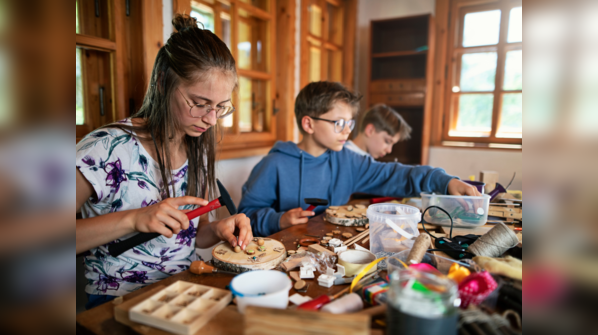Just like adults, children thrive on motivation to grow, improve, and become their best selves. Navigating the world of distractions is a crucial skill for kids. Mastering this skill early can provide a significant advantage. As Robert Kiyosaki said, "Your future is created by what you do today, not tomorrow." This highlights the importance of cultivating focus and concentration from a young age.
Here are some practical tips to help children minimize distractions and enhance focus:

Resist the urge to punish a child for lack of focus. Punishment can lead to rebellion. Instead, try positive reinforcement. Praise and encouragement can be incredibly effective. Simple phrases like "Good job!" or "Great work!" can have a lasting impact. These positive affirmations can encourage children to remember the positive experience and think twice before engaging in disruptive behavior.

Constantly pushing children to study, make friends, or learn new skills can backfire, leading to increased distraction. Children are naturally prone to distractions. Pressuring them, instead of patiently guiding them, can make them resistant. Over time, with patience and understanding, children will learn to manage their attention and find their focus.

Presenting children with overwhelming tasks can lead to feeling pressured and avoidance. Children need time to process information. Their minds can only handle so much at once. Instead of completing the assigned work, they might opt for more appealing activities like video games or playing with friends. Breaking down tasks into smaller, manageable segments makes them less intimidating. This approach increases the likelihood of timely completion and fosters a sense of accomplishment.

Consider whether you would willingly engage in activities you find boring. Similarly, children need novelty and engagement. The goal isn't to turn everything into a game, but to boost focus and productivity by transforming mundane tasks into engaging experiences. Involve children in everyday activities like setting the table or organizing items. These activities can capture their interest and improve their overall concentration.

A balanced diet is essential for children's development. While children can be picky eaters, it’s important to prioritize greens and proteins. A protein-rich diet, with limited junk food and sugar, supports concentration levels. While occasional treats are acceptable, moderation is key.

Completely restricting technology use may be unrealistic in today's world. Instead, manage screen time by setting limits on duration and content. Studies show that children perform better in environments with minimal distractions and stress. Encourage children to explore the outdoors and appreciate nature, rather than staying indoors.

Consider your own ability to focus and perform tasks effectively when sleep-deprived. A consistent sleep schedule is crucial for a child's ability to focus. Adequate sleep, typically 9-12 hours, promotes better concentration and reduces irritability.
Newer articles
Older articles
 Samsung Galaxy A35 5G and A55 5G: Full Pricing and Specs Revealed
Samsung Galaxy A35 5G and A55 5G: Full Pricing and Specs Revealed
 Warning Signs: 5 Clues Your Body May Be Signaling Prediabetes
Warning Signs: 5 Clues Your Body May Be Signaling Prediabetes
 Expert Tips to Help Kids Sharpen Focus and Combat Distractions
Expert Tips to Help Kids Sharpen Focus and Combat Distractions
 SA20 Teams Allowed Up to Six Player Retentions, Enhanced by New RTM Card and Increased Salary Cap for Upcoming Auction
SA20 Teams Allowed Up to Six Player Retentions, Enhanced by New RTM Card and Increased Salary Cap for Upcoming Auction
 Brain's Eye View: Study Shows We See the World 15 Seconds in the Past
OR
The 15-Second Delay: How Your Brain Creates a Seamless, But Delayed, Reality
Brain's Eye View: Study Shows We See the World 15 Seconds in the Past
OR
The 15-Second Delay: How Your Brain Creates a Seamless, But Delayed, Reality
 Cervical Cancer: Don't Ignore These 5 Subtle Warning Signs
Cervical Cancer: Don't Ignore These 5 Subtle Warning Signs
 Science-Backed: 5 Simple Daily Habits for a Healthier Heart
Science-Backed: 5 Simple Daily Habits for a Healthier Heart
 Shimron Hetmyer's Last-Gasp Six Stuns MI New York, Orcas Complete Record MLC Chase
Shimron Hetmyer's Last-Gasp Six Stuns MI New York, Orcas Complete Record MLC Chase
 Oral Cancer: Spotting the Signs, Understanding the Risks, and Why Early Detection is Critical
Oral Cancer: Spotting the Signs, Understanding the Risks, and Why Early Detection is Critical
 Infrequent Bowel Movements: When Is It Time to Worry? A Guide to Healthy Digestion
Infrequent Bowel Movements: When Is It Time to Worry? A Guide to Healthy Digestion